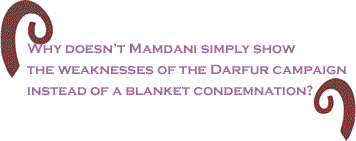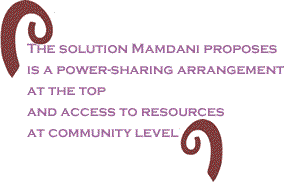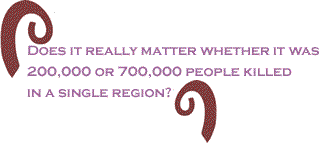
|
|||||||||||||||||||||
 |
|||||||||||||||||||||
 |
|
|
Has Mahmood Mamdani the pre-eminent African scholar become an Arab supremacist apologist? A careful reading of his much circulated, “The Politics of Naming: Genocide, Civil War, and Insurgency”, provides more than enough evidence to suggest that this great progressive thinker has succumbed to the charms of tribe and perhaps religion. Mamdani employs strange logic, dubious sources, and nonsensical devices to arrive at his denialist conclusion - there is no genocide in Darfur! If that was his only project, we could perhaps leave him to stew in his new found prejudices. But when he denies the victims of Khartoum’s project of subjugation of Black Africans through elimination and displacement, then we are compelled to speak up or be complicit in this deletion of a people, under the guise of a crusade against imperialism and Islamophobia. The progression of Mamdani to his current despicable position has been gradual but certain, see his 2004 “Darfur Crisis”. Mamdani’s argumentative approach – drawing an analogy between Darfur and Iraq – effectively denies the plight of Darfur’s Black Africans to be understood on its own terms. The fact that the Darfur campaigners may be misguided in calling for American intervention, and the fact that the USA has nasty imperial intentions in Sudan, or that the war on terror is terrorism, should not be used as an excuse not to condemn the settler Arab scheme of colonial expansion and death in Sudan. Some of us Black Africans support the Anti-War movement and march against the invasion of Iraq, the murderous attacks on Lebanon and the illegal occupation of Palestine, whilst alive to the fact that most of those we march with are fired by religious and tribal zealotry and see the exercise as the preservation of the self, they care not a hoot about the plight of Black Africans who have been under constant fire from Imperialism themselves. Why doesn’t Mamdani simply show the weaknesses of the Darfur campaign instead of a blanket condemnation? If we cut through all the historical and sociological verbiage masquerading as uninterested scholarship proffered by Mamdani, we can more clearly see his Arab settlerist sympathies. He uses a hierarchy of suffering method (genocide, crimes against humanity, crimes of war and civil war) to show that what is occurring in Darfur is not genocide but, a “civil war”, the lowest in his rubric of suffering. His aim is to plead the case of Khartoum and the counter insurgency, by denying the historical roots and the continued settler Arab and African problematic on the African continent and Sudan in particular. Throughout his argument, Mamdani strains to point his torch light on the insurgency as equally if not more responsible for what’s happening in Darfur. In this way violence for liberation and resistance is equated with violence for repression and dispossession.
It is strange logic indeed from one who laments the absence of context, politics and motivations from the Darfur campaigners, to be so silent on what drives Khartoum, the insurgency and counter insurgency. We are left to hold on to the thin thesis that the basis of the conflict is the power struggle among a de-raced elite at the top, which finds expression locally through the battle between nomads and settled farmers. We are informed that the one group got rich and started an insurgency, and Khartoum armed the poorer Nomad and formed a militia. Hence, the solution Mamdani proposes is a power-sharing arrangement at the top and access to resources at community level. A noble idea until you scratch a little further. We are in the dark as to the social and racial composition of the competing political elites, or what the demands of the insurgents are. Anyone with a passing interest in Sudan would know that there has been a long national liberation struggle going on against the Arab minority Khartoum regime by Black Africans from the South, led by the late John Garang. This is the larger political context which Mamdani does not touch in his erudite apologia for Arab settlerism. But to deny the reality of Arab settler colonialism in the Sudan, one has to deny the race question. So we are subjected to deft foot-work by the able Mamdani, playing on the indeterminacy and effervescence of race as a social signifier (in the white academy), we are told that Arab and African have multiple meanings in the Sudan and Black Africans “could become” Arabs over time. This is an ahistorical, de-contextualised presentation of what has essentially been a colonial encounter, its not some kind of arbitrary choosing of one’s race. The history of “Arabization” of the African is so painful that it’s never spoken about in polite company. That Arabization is deeply wrapped in the most brutal forms of deleting the essence of a people through refusal of language, religious and other “uncivilized” cultural practices is never acknowledged. In reality, Arabization is colonialism bordering on the physical eradication and more importantly the erasure of the very souls and being of the Black African. Perhaps it will interest Mamdani to know that, of the more than 100 Black languages spoken in Sudan, not one is recognized by Khartoum in its total commitment to promoting Arabic. As late as last year the Minister of education in the Northern state had issued instructions that no student will speak any Nubian language within school premises at the pain of public humiliation. And Mamdani tells us that Black Africans “could become” Arab as if they where choosing one brand of washing powder instead of another in a supermarket shelf. In South Africa we know of a process of Black Africans passing as colored during apartheid, only because that despicable regime had given certain privileges to people classified as colored in the Western Cape. Passing for colored required a deletion of the Black African self. Families were broken; people would not answer to their Black names, even to the point of passing family members on the street, for fear of detection. A total nervous condition defined those alienated Blacks. No people choose another’s identity out of charity. The idea that the kin color of the one pulling the trigger determines whether a conflict is racialist or not is too simplistic a yardstick to go by. In South Africa, toward the end of formal apartheid, the white supremacist Pretoria regime encouraged the concept of “Black on Black” violence to explain its sponsored violence against Black liberation. True, in the now Gauteng province, Zulu speakers, organized under the tribalist Inkatha outfit, maimed and killed, without mercy, Zulu-speaking people in Black townships. Unless one was an apologist of apartheid no one bought the “Black on Black” violence lie. In Darfur, yes, some members of the Janjawiid may be as Black as coal, but what master and what political and religious ends do they serve?
Khartoum’s heartless manipulation of tribal differences has led to some gruesome acts, such the 1987 attack on the Dinka by the Baggarra Arabs, armed by the government. Sudanese scholar, Jalaal Haashim, brings to life the day of attack:“In one day in mid-1987, at least 1,000 Dinka were massacred, 4,000 were burned alive, and the survivors - around 1,000 were enslaved”. These acts of aggression are all calculated to entrench the Arab minority regime in Sudan, but also speak to the ongoing Arab colonialist project, which started with the conquest of Egypt by 642 AD. In this regard we must be moved to wonder aloud with Chinweizu:
It may useful to ask, indeed, what happened to all the slaves shipped to the middle east during the Arab slave trade? Then of course there is the matter of continued slavery, not some voluntary Arabization currently going on by Arabs against Black Africans in places like Mauritania and Sudan itself. Is it not a rather strange thing to think that Africans are joining queues to be Arabized in Africa? One would have thought the process should be the other way round. There are a few bizarre if not shocking arguments that Mamdani employs in his over-drive ostensibly to show Western hypocrisy. Consider, for instance, his single-handed obsession with New York Times columnist Nicholas Kristof. Mamdani entered a numbers orgy with the columnist about how many people were actually killed, and at the end, he emerged as tainted as those he accuses of devaluing Black Africans’ lives. Does it really matter whether it was 200,000 or 700,000 people killed in a single region? Anyway, those of us who are familiar with denialist strategies know that the first thing to attack is the authenticity of numbers; what of course complicates matters is that, in general, Black bodies are not counted – dead or alive. One is left wondering, if it were a million killed, would Mamdani change his mind then? The pursuit of Kristof’s numbers games raises a fundamental question, what is Mamdani’s own characterization of such a mass slaughter? Well lo and behold! Mamdani relies on the Nigerian President, Obasanjo, for authority that there is no evidence of a plan by Khartoum to decimate Blacks. Since when do consummate social scientists rely on heads of state for authority? The latest UN Human Rights Commission report speaks plainly about the connection between the Janjawiid and Khartoum, but did not say “genocide”, therefore we must not expect any change of heart from Mamdani.
Even his reading of the Security Council’s five person commission report on Darfur, submitted in 2005, is interesting. We expect a scholar with integrity to go beyond the lawyerly presentation of evidence, to illuminate reality on the ground, but Mandani cannot do so because his heart is in Iraq. He ends up spending all his energy trying to show moral equivalence between what he terms the “insurgency and counter-insurgency”. Once he nails his colors on the mast, he has to do anything and everything to support his position. Therefore, because the commission said the government of Sudan “has not pursued a policy of genocide”, that must be the end of the story. Legally, genocide has to have, amongst other elements, “intention to eliminate a group”. Armed with this definition of genocide and the pronouncement by Obasanjo, Mamdani goes on to summarize the commission’s findings thusly: that three violations of international law occurred in Darfur, “disproportionate response (by Khartoum) conducted on a widespread and systematic basis, targeting entire groups … but without the intention to eliminate them as groups”. How do we determine intention? How do you indiscriminately target, with live ammunition, a group and have no intention to eliminate? Do we stick to the letter of the word, listen to Obasanjo or do we look at mass graves, still expanding, for evidence? The alternative and honest view, devoid of clever rationalization and empty legaleze, would be that those who are being killed are collateral damage as the Sudanese Arab elite legitimately fight an illegal insurgency. Just when one thinks it would end, Mamdani goes further, declaring “… peace cannot be built on humanitarian intervention, which is the language of big powers”. Whilst milling on that one, what must one make of this: “… chronicling of atrocities had a practical purpose: it provided the moral pretext for intervention”. Here Mamdani milks the anti-imperial discourse to deny the Arab colonialist intentions and practices against Black Africans. But worse, he does this to deny the Black Africans of Darfur the right for their suffering to be recognized in its own right. It’s hard to understand why Mamdani so desperately seeks to reduce the suffering of Black Darfurians. Except, of course, that in his legitimate battle against Islamophobia and Western Imperialism, he ends up an Arabist supremacist apologist. The tragedy is that he need not be. The fact that the Durfur campaigners may be misguided in calling for American intervention, and the fact that the USA has nasty imperial intentions with Sudan, or that the war on terror is actually terrorism should not be used as an excuse not to condemn the settler Arab scheme of colonial expansion and death in Sudan. Mamdani’s call for a political settlement, based on a power-sharing mechanism in Sudan and Darfur smacks of the apartheid regime’s attempt to legally entrench minority rights as a device to perpetuate white privilege. However, the suggestion falls flat when it confronts the reality that the Arab elite is prepared to fight to maintain its rule as shown by the recent refusal by Khartoum to let into Darfur the UN Human Rights Commission. If in doubt, let’s hear the ominous words of President Omer al-Bashir: “We have assumed power with arms; those who want power, or want to share it, should be men and fight for it."
Using blackmail and threats, Mamdani warns against the USA intervention in Sudan, because such an intervention would lead to a real genocide a la Rwanda and not the current “rhetorical” genocide. Most progressive people would agree with his proposition around American intervention, but only in that he does not provide any real scope for intervention, even by African forces. He, instead, calls for a political solution to the “civil war”. What’s puzzling is Mamdani’s lack of sense of urgency in the face of the continued mass murder of Blacks in Darfur, coupled with a stubborn refusal to see Khartoum for what it is: an illegitimate settler minority regime hell-bent on Arab colonial expansion at all cost. It boggles the mind as to why Mamdani chooses the narrow path of “UN speak” and politicians’ logic to construct a hierarchy of suffering. Who cares whether Khartoum has a plan to decimate those Black Africans or not? The reality is that it has sponsored the killing of between 200,000 and 500,000 and still continuing. Why can’t we condemn these killings with the same intensity and anger as the deaths in Rwanda, Congo, Iraq and Palestine? In condemning, let’s not allow tribal, religious or race prejudices to stop us from pointing a finger at the culprits and their deadly intentions. That’s what we can, at the least, expect from thinkers of Mamdani’s caliber. Andile Mngxitama is a land activist and a Pan Africanist from South Africa, he is a co-editor of a forthcoming volume titled, Biko Lives - Conversations and Contestations. He can be reached at [email protected]. |
|
| Home | |
| April
5, 2007 Issue 224 |
||||||||||||||
|
||||||||||||||
| Printer Friendly Version in resizeable plain text format | ||||||||||||||
 |
||||||||||||||
|
||||||||||||||
 |
||||||||||||||
 |
||||||||||||||
 |
||||||||||||||
| |
||||||||||||||
| |
||||||||||||||

































